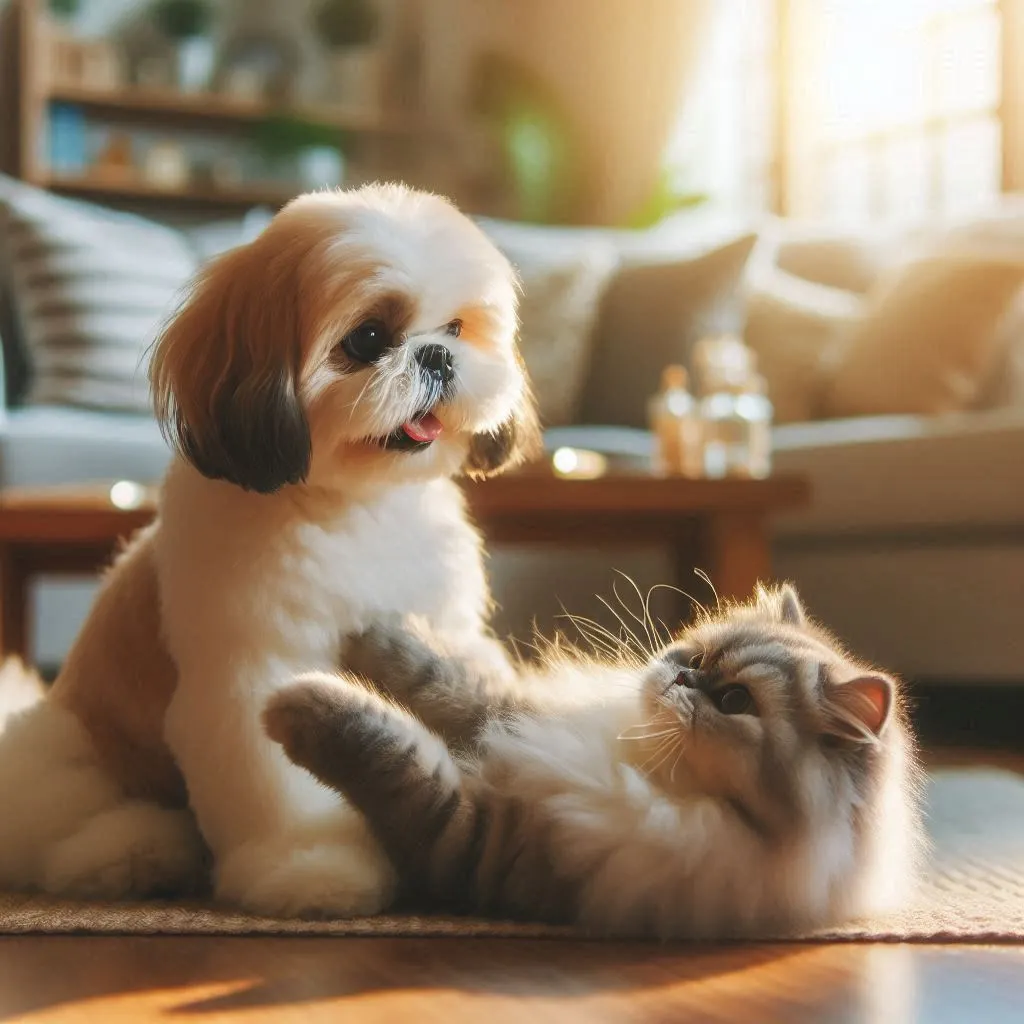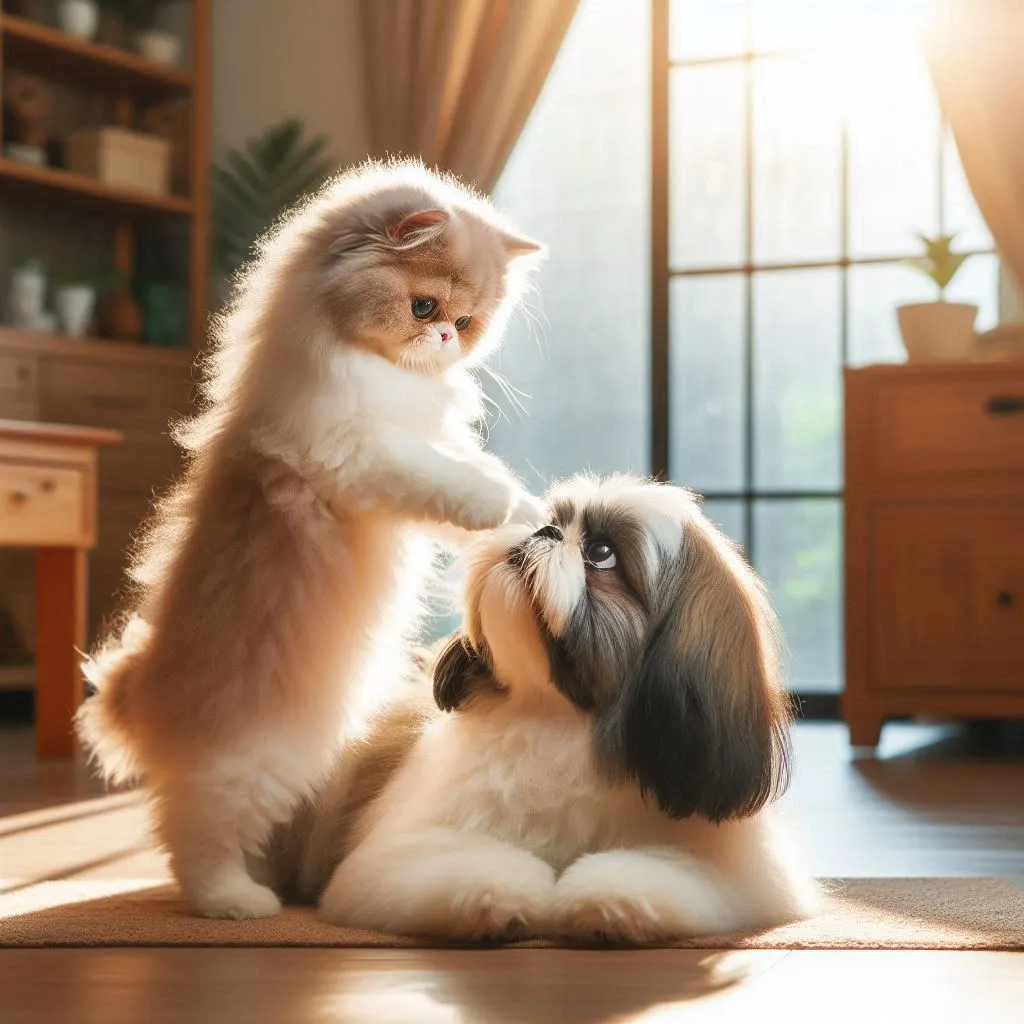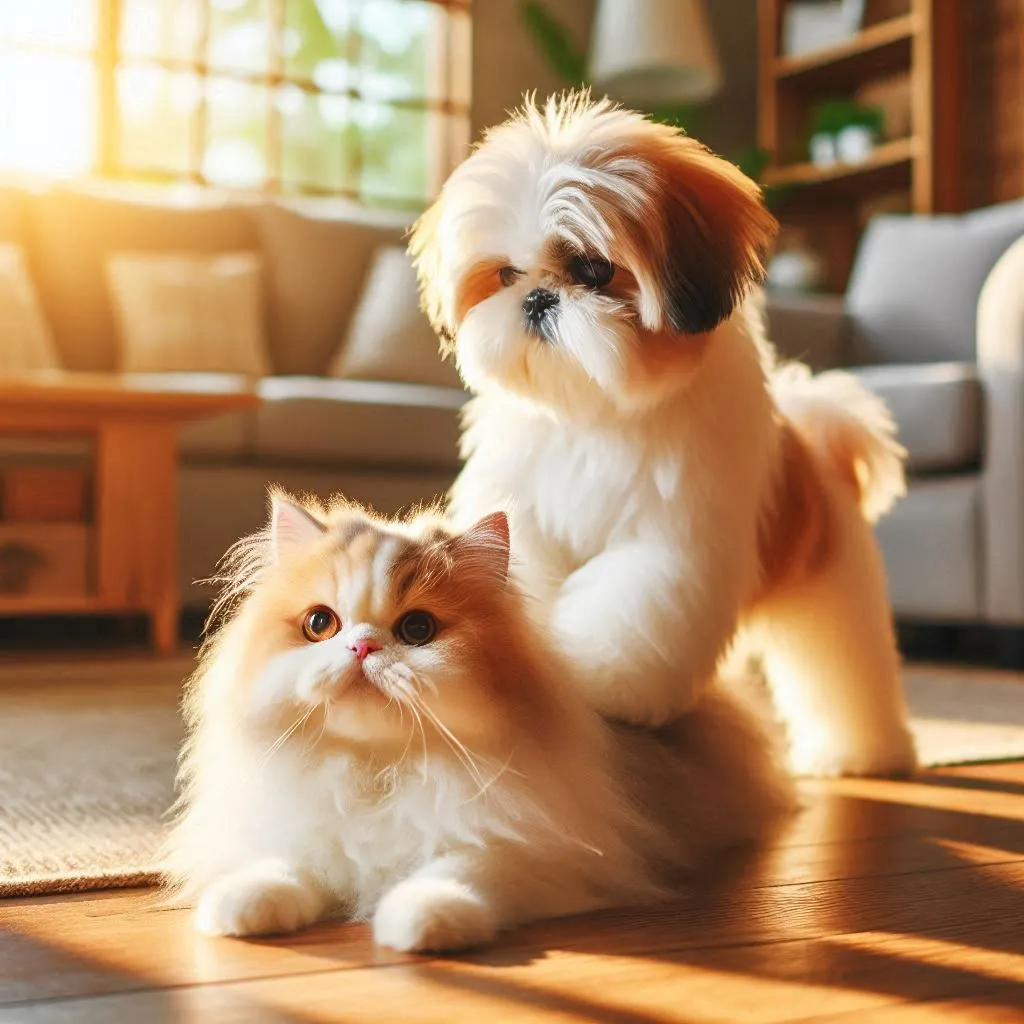Can Shih Tzus Get Along with Cats? Temperament Insights on This Breed
Regarding the age-old question of cats and dogs living together, many pet owners wonder if the adorable Shih Tzu can peacefully coexist with feline companions. This popular dog breed, known for its charming personality and luxurious coat, has captured the hearts of many. But can Shih Tzus get along with cats? Let’s explore the temperament of this breed and uncover insights into their potential for feline friendships.
What is the typical temperament of a Shih Tzu?
Shih Tzus are generally known for their friendly and affectionate nature, making them a popular choice among dog lovers. This breed’s temperament is often described as warm, outgoing, and adaptable, contributing to their ability to get along well with various family members, including other pets. Shih Tzus are small dogs with big personalities, and their loving disposition often extends beyond their human family to other animals in the household.
Are Shih Tzus naturally friendly and affectionate?
Indeed, Shih Tzus are renowned for their affectionate nature. These furry companions thrive on human interaction and are often called “velcro dogs” because they tend to stick close to their owners. This innate friendliness is not limited to humans; Shih Tzus usually extend their warmth to other animals, including cats. Their gentle and loving demeanor makes them an excellent choice for multi-pet households, as they are more likely to seek companionship rather than conflict with feline housemates.
How playful are Shih Tzus compared to other breeds?
Shih Tzus are moderately playful compared to some other dog breeds. While they enjoy a good romp and playtime, they are less high-energy than some working or sporting breeds. This balanced level of playfulness can be advantageous for interactions with cats. Shih Tzus are likely to engage in gentle play sessions less intimidating to cats than boisterous play that might frighten a feline companion. Their playful nature is often expressed through short bursts of activity, followed by periods of relaxation, which aligns well with many cats’ activity patterns.
Does Shih Tzus have a calm or energetic personality?
The Shih Tzu’s personality tends to lean more towards the calm side, although they do have moments of playful energy. This balanced temperament is one of the reasons why Shih Tzus makes excellent companions for various households, including those with cats. Their calm demeanor means they are less likely to chase or startle cats, crucial for peaceful coexistence. However, it’s important to note that every dog, including Shih Tzus, has a unique personality. Some may be more laid-back, while others might be slightly more energetic, but in general, the breed is known for its even-tempered nature.

Are Shih Tzus considered good with cats?
Shih Tzus is often regarded as one of the more cat-friendly dog breeds. Their gentle nature and moderate energy levels make them well-suited for living with feline companions. However, while the breed’s general temperament is favorable for cat interactions, individual experiences may vary. Factors such as early socialization, training, and the personalities of the Shih Tzu and the cat play significant roles in determining how well they will get along.
What makes Shih Tzus cat-friendly dog breeds?
Several characteristics contribute to Shih Tzus being considered cat-friendly:
- Their small size means they are less intimidating to cats than larger breeds.
- Shih Tzus are not typically prey-driven dogs, which reduces the likelihood of them chasing cats out of instinct. Their affectionate nature extends to other animals, making them more inclined to view cats as potential friends rather than adversaries.
- Shih Tzus are generally adaptable and can learn to respect a cat’s space and boundaries with proper training and socialization.
How does Shih Tzus typically interact with felines?
When introduced properly, Shih Tzus often interacts with cats gently and curiously. They may approach cats slowly, attempting to sniff and investigate their new feline housemates. Due to their friendly nature, Shih Tzus might try to initiate play or seek companionship from cats. However, they usually respect a cat’s personal space and can learn to give cats the necessary distance when required. It’s not uncommon to see a Shih Tzu and cat curled up together or peacefully coexisting in the same room, each enjoying the other’s company in their own way.
Can Shih Tzus and cats become friends?
Absolutely! Shih Tzus and cats can become great friends, especially when introduced at a young age. Many pet owners report heartwarming stories of their Shih Tzus and cats forming strong bonds, playing together, and grooming one another. The key to fostering this friendship is proper introduction, consistent positive reinforcement, and ensuring that both pets feel safe and comfortable in their shared environment. With patience and the right approach, a Shih Tzu and a cat can develop a companionship that brings joy and entertainment to the entire household.
How to introduce a Shih Tzu to a cat?
Introducing a Shih Tzu to a cat requires patience, careful planning, and a gradual approach. The process should be handled carefully to ensure both pets feel safe and comfortable throughout the introduction. During their initial interactions, it’s essential to create positive associations and experiences for the Shih Tzu and the cat.
What are the best practices for introducing a Shih Tzu puppy to a kitten?
When introducing a Shih Tzu puppy to a kitten, starting with controlled, supervised interactions is crucial. Begin by allowing them to see and smell each other from a safe distance, such as through a baby gate or with one pet in a carrier. Gradually increase their exposure to each other while providing positive reinforcement for calm behavior. Encourage gentle interactions and redirect any overly enthusiastic play from the puppy. Giving both the Shih Tzu pup and the kitten separate spaces to retreat and feel secure is important. Consistency and patience are key, as young animals may take time to learn appropriate social behaviors.

How long does it take for a Shih Tzu and a cat to get along?
The time it takes for a Shih Tzu and a cat to get along can vary greatly depending on the individual animals’ personalities, previous experiences, and the introduction process. Some Shih Tzus and cats may form a bond within a few weeks, while others might take several months to fully adjust to each other’s presence. It’s important to take your time with the process and to allow both pets to set the pace of their relationship. Consistent positive interactions, supervised meetings, and plenty of patience will help foster a harmonious relationship between your Shih Tzu and cat over time.
What precautions should be taken when introducing a Shih Tzu to a cat?
When introducing a Shih Tzu to a cat, several precautions should be taken to ensure the safety and comfort of both pets. First, ensure your cat has easy access to high perches or escape routes where they can retreat if feeling overwhelmed. Keep your Shih Tzu on a leash during initial face-to-face meetings to prevent chasing or overly excited behavior. Ensure that both pets are up-to-date on vaccinations and parasite prevention before allowing close contact. Always supervise interactions and be prepared to intervene if necessary. Maintaining separate feeding areas and litter boxes is important to prevent resource guarding and give each pet space.
What challenges might arise when Shih Tzus and cats live together?
While Shih Tzus and cats can often coexist peacefully, potential challenges may arise when these two species share a home. Understanding these challenges can help pet owners proactively address issues and create a harmonious living environment for their furry companions.
How do we manage territorial behavior between Shih Tzus and cats?
Managing territorial behavior between Shih Tzus and cats requires a thoughtful space allocation and resource management approach. Ensure each pet has designated areas for sleeping, eating, and relaxation. Provide multiple litter boxes for cats in locations that are easily accessible but out of the Shih Tzu’s reach. Use vertical space to create cat-only zones, such as cat trees or high shelves, where felines can retreat when they need solitude. For Shih Tzus, cozy dens or beds should be created in quiet areas of the house. Regularly rotate toys and provide individual attention to both pets to minimize competition for resources and affection.
Can Shih Tzus become jealous of cats?
Like many dog breeds, Shih Tzus can become jealous of the attention given to cats in the household. This breed’s affectionate nature means they crave human interaction and may feel left out if they perceive the cat is receiving more attention. To prevent jealousy:
- Ensure your Shih Tzu gets plenty of one-on-one time, affection, and mental stimulation.
- Balance your interactions with both pets and avoid showing favoritism.
- Include your Shih Tzu in activities involving the cat, such as playtime or grooming sessions, to foster a sense of inclusion and prevent jealousy from developing.
What to do if a Shih Tzu and a cat don’t get along well?
If your Shih Tzu and cat struggle to get along, it’s important not to lose hope. Start by reassessing their living arrangements and ensuring each pet has enough personal space. Consult a professional animal behaviorist or veterinarian who can provide tailored advice for your situation. They may recommend techniques such as desensitization and counterconditioning to improve the relationship between your pets. In some cases, it may be necessary to temporarily separate the Shih Tzu and cat, gradually reintroducing them under controlled circumstances. Patience and consistency are key; with time and proper guidance, many initially incompatible pets can learn to coexist peacefully.
How does the Shih Tzu’s size affect its relationship with cats?
The Shih Tzu’s small stature is significant in its potential for harmonious relationships with cats. This breed’s compact size contributes to its ability to coexist peacefully with feline companions, often making the introduction and ongoing interactions smoother than larger dog breeds.
Are Shih Tzus less intimidating to cats compared to larger breeds?
Indeed, Shih Tzus are generally less intimidating to cats than larger dog breeds. Their small size means they’re closer in stature to most domestic cats, which can help reduce fear and anxiety in felines. Cats may feel more comfortable approaching or sharing space with a Shih Tzu than with a larger, more imposing dog. This size similarity can facilitate more positive interactions and make it easier for cats to establish boundaries without feeling overwhelmed. However, it’s important to note that while size is a factor, the individual temperaments of both the Shih Tzu and the cat will ultimately determine the success of their relationship.
Can Shih Tzus and cats play together safely?
Shih Tzus and cats can indeed play together safely, provided their interactions are supervised, and both pets are comfortable with each other. The Shih Tzu’s size makes them less likely to accidentally injure a cat during play, and their generally gentle nature means they’re more inclined towards softer play styles. However, monitoring their play sessions is crucial to ensure neither pet becomes too rough or overstimulated. Encourage gentle games and provide appropriate toys that both species can enjoy. If the Shih Tzu or the cat shows signs of stress or discomfort, it’s important to intervene and give them a break. With time and positive experiences, many Shih Tzus and cats develop unique play and bonding methods.
What training techniques help Shih Tzus get along with cats?
Training is essential in fostering a positive relationship between Shih Tzus and cats. Pet owners can employ effective training techniques to help their Shih Tzus learn to respect feline housemates and create a harmonious multi-pet household. Consistency, patience, and positive reinforcement are key elements in this training process.
How effective is positive reinforcement in teaching Shih Tzus to respect cats?
Positive reinforcement is highly effective in teaching Shih Tzus to respect cats and maintain appropriate behavior around them. This training method involves rewarding desired behaviors, such as calm interactions or respecting the cat’s space, with treats, praise, or affection. By consistently reinforcing positive behaviors, Shih Tzus learned to associate these actions with pleasant outcomes, making them more likely to repeat them in the future. For example, immediately offer a reward when your Shih Tzu remains calm in the presence of a cat or responds to a command to leave the cat alone. This positive association helps build a foundation of respect and good behavior towards feline companions.
What commands should a Shih Tzu learn to coexist peacefully with cats?
Several key commands can help a Shih Tzu coexist peacefully with cats. “Leave it” is crucial for teaching your dog to ignore the cat when necessary, especially if the cat doesn’t want to interact. “Stay” and “Come” are important for controlling your Shih Tzu’s movements around the cat, preventing chasing or unwanted approaches. “Gentle” can be useful for encouraging calm, non-threatening interactions. Additionally, teaching a solid “down” or “place” command gives your Shih Tzu a default behavior to perform when the cat is present, promoting a relaxed environment. Consistently practicing these commands in various situations, including around the cat, will help your Shih Tzu understand how to behave appropriately in a multi-pet household.
How to correct Shih Tzu’s unwanted behavior towards cats?
Correcting Shih Tzu’s unwanted behavior towards cats requires a combination of redirection, positive reinforcement, and consistency. When you observe undesirable behavior, such as chasing or excessive barking at the cat, immediately interrupt it with a firm but calm “no” or “ah-ah.” Then, redirect your Shih Tzu’s attention to a more appropriate activity or command, such as “sit” or “leave it.” Once your dog complies, offer praise and rewards to reinforce the good behavior.
It’s crucial to avoid physical punishment or harsh scolding, as this can create negative associations and potentially worsen the relationship between your pets. Instead, focus on rewarding calm, respectful behavior around the cat. If problematic behaviors persist, consider consulting a professional dog trainer or animal behaviorist for personalized guidance on addressing specific issues in your household.















Post Comment